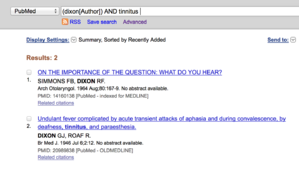The potential cure is based on this - it's an iPad app which generates sounds designed for suppression
Dr. Puls, if indeed this is an iPad application, why is there a need to have funding to test if it works? You could just arrange a local gathering of tinnitus volunteers and find out if it works (on a small scale)? Have you already done this? [I realize you have sort of answered this in another post; see next quote].
My sister wanted to volunteer, for instance.
There is nothing to prevent her from doing so. Nobody will ever know if she took part in a (harmless) medical experiment. If the "treatment" consists purely of sound, then "you" - the medical provider - is doing nothing more than providing the "patient" with sound therapy (which is freely available all over the Internet). This would be equivalent to you lending your sister a CD with classical music. I don't believe anyone ever got arrested for doing so (at least not from a medical perspective).
and you have to play by the FDA rules
I did not know that the FDA governed the rules of local clinical trials in eg. Australia or the UK. Or Denmark for that matter...
------------------------------------------------------------------------------------------------------------------------------------------
Dr. Puls, the topic of treating tinnitus using sound therapy (eg. Neuromonics' flagship model
Oasis and the more advanced(?)CRN-modulation) has already been around for a while (as other posters have mentioned). The results are "so-so" (at best). I appreciate you taking the time to join the forum, but I find it hard to believe that the results from your device should somehow be(come) revolutionary ie. what makes your research "so special" that others would have missed it? Currently, the combined capital raised by all pharmaceutical companies involved in the field of otology therapies would easily reach the ½-billion dollar mark (see finanial overview in the attachment which I have compiled). If there was a simple and cost effective therapy - not to mention "side-effectsless" - why would anyone bother to spend millions on pharma? So, yes, I am (also) skeptical, but I would also hate to see good potential wasted. As it happens, I am fairly well connected in the start-ups field. My Father is based in Geneva and is investor and mentor in a business that secures funding for start-ups. The approach is two fold: any successful applicant will automatically be provided start-up capital and free office space for 3 months. Applicants will also be given the chance to present their business ideas in front of big sponsors in order to secure further funding. They focus on pretty much anything which is IT related (ie. Internet commerce, mobile phone technology, software, GPS, iPhone apps, etc.). They do not specifically focus on medical technologies (far from), but they have had previous applicants who had developed iPhone apps for such things as displaying heart rate and possibly other patient stats. I am not going to go into too much detail on a public forum. But... I am sort of curious as to how you believe this application of yours is a) going to work, and b) why it is not already been tested informally on volunteers (ie. outside of a clinical trial)? Without knowledge of such basic questions, why would anyone want to invest anything in a company? As a financial investor myself, I don't care about interesting research; I care about results! And preferably the tangible kind which can be read on a profit/loss statement.
I appreciate your colleague(?) Dr. Dixon taking the time also to respond to a couple of posts. I agree that tinnitus is underestimated in children. Most ENTs would describe tinnitus in children as "very rare". Tinnitus in children is neither "very rare" nor "rare", but probably best described as "uncommon". However, I am not sure that tinnitus is necessarily something that goes away when passing into adulthood (but I am not saying it does not in some cases). But even if it does go away, then I am not sure I see the connection between your device and the disappearance of tinnitus in children (but of course this is your "business secret", I guess).

 Member
Member but i wish you guys the best of luck... If this would work this would probably be an actual cure unlike drug therapy where most likely having to take a drug everyday to supress the T. either way i think us with T arent too picky when it comes to treating it, so what ever works best the better but ofcorse i hope this works too
but i wish you guys the best of luck... If this would work this would probably be an actual cure unlike drug therapy where most likely having to take a drug everyday to supress the T. either way i think us with T arent too picky when it comes to treating it, so what ever works best the better but ofcorse i hope this works too